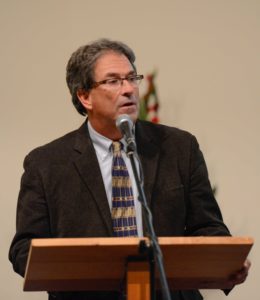
Lecturer in Ministry Practice
Uniting College for Leadership & Theology
Is an undergraduate of Flinders, holds a Bachelor of Theology 1988 and is very happy to be an Alumni.
The humanities component of that degree taken up at Bedford Park was a genuine highlight of his educational life thus far.
Thesis ‘Spiritual Affections and the Pastoral Disposition’
Here sharing with you the reflections and insights on winning this award;
This award affirms the hard work put in and the persistence needed to create a credible and readable piece of research.
It means a great deal that the little known discipline of pastoral theology has been recognised alongside higher-profile ones within a University context.
I am appreciative of the RHD support structures and the constant encouragement given – even through the annual accountability and reporting processes!
On choosing Supervisors, given the limited pool in the area of theology, they somewhat chose themselves!
In all seriousness, I am very grateful for their perseverance and for the professional expertise they demonstrated all the way to the end of the process.
I am most proud as I sought to bring two seeming disparate disciplines into a respectful conversation, viz. [cultural studies] affect theory and a Christian theology of spiritual affect.
What is often considered to be an irreconcilable gulf between the secular and the sacred proved to have surprising and, I think, meaningful points of connection.
Flinders makes this important work of cross-discipline research possible.
Why PhD and where are you now;
I choose a PhD as it was the right time in my personal and professional life.
My advice to others current or prospective is although the topic and research question evolves naturally over time, keep them before your mind’s eye constantly.
I had my research question taped to the bottom of my computer monitor so I could check to see if my current writing bore any resemblance to what the project was supposed to be about!
Secondly, choose a topic that you feel strongly about or are consistently interested in.
I was a part-time student and the thesis took six years to complete. That is a long time to remain intellectually and emotionally engaged in specialised areas of research and detailed writing.
You need to enjoy what you are doing (for the most part)! Finally, if your supervisors are not experts in the specific field of your research, find someone outside the formal structures who understands what you are trying to say and why.
It may be just a coffee or Zoom meeting every few months but a little bit of empathy and shared passion/knowledge goes a long, long way.
I now teach in the area of pastoral theology, so the research and writing has deepened my teaching content and, I suspect, broadened my teaching capacity.
On looking forward my examiners have encouraged me to publish the thesis in some shape or form. That will be the next professional development project on my plate.
My involvement in the community is perhaps modest yet significant in ways for those willing to dialogue with me.
Advancing an affective basis for authentic human knowing and being is not the easiest kite to fly – outside yet also within the Christian community.
And then there is the theological interface which for some takes my research outside the bounds of what is believable and indeed practical.
Obviously, I don’t think that is the case but it makes “impact” a greater challenge, though not impossible, particularly given the many fruitful conversations I have had over the last six years, either informally or within conference/academic environs.

